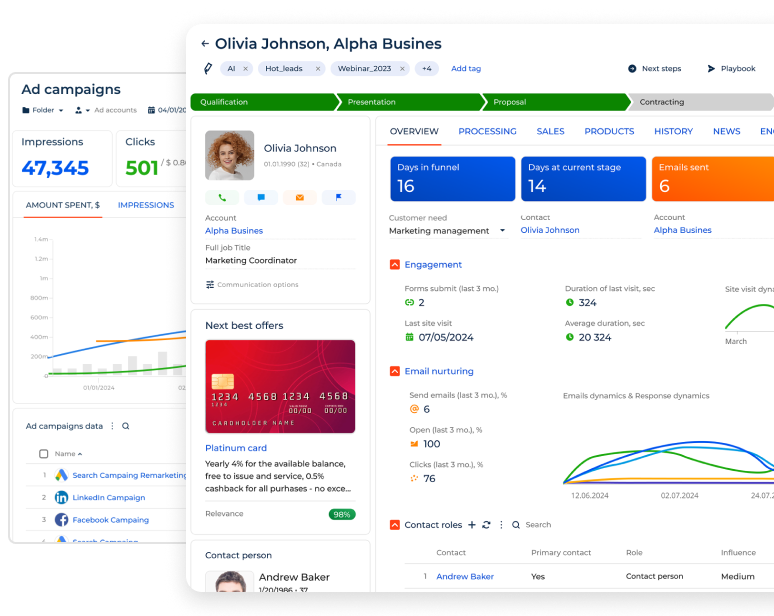-
No-code
Platform
-
Studio
No-code AI-native platform to build applications faster
Discover

-
Studio
-
AI-Native CRM


-
Industries

- Customers
-
Partners

-
About

CRM Software: Essential Insights and Leading Solutions for 2026
Updated on
September 01, 2025
23 min read
Drive Operational Efficiency with Creatio’s Agentic CRM

Customer relationship management (CRM) software has established itself as an essential tool for managing client relationships effectively. Broadly adopted throughout departments, it allows for the centralisation of data, the simplification of processes, and enhanced collaboration across teams – ultimately contributing to a superior customer experience.
Key Findings
- The main drivers behind CRM software adoption include inefficiencies in current processes (40%), limited capabilities of existing tools (31%), and the need to pursue new business opportunities (11%) (Capterra).
- The majority of CRM platforms provide core functionalities, including contact management, sales and marketing automation, customer service tools, analytics, and integration with third-party systems.
- To make the most of these systems, many modern CRMs now incorporate AI to deliver predictive insights, automate day-to-day tasks, personalise customer interactions, and enhance decision-making in real time.
- The next evolution of CRM is Agentic CRM — platforms such as Creatio CRM, powered by role-specific AI agents that go beyond automation to act proactively on behalf of teams. These systems enable businesses to scale workflows more efficiently and deliver smarter, more personalised customer experiences.
What is CRM Software?
Customer Relationship Management (CRM) software is a platform that enables businesses to centralise customer data, monitor interactions, and automate workflows throughout the entire customer lifecycle. With CRM, organisations can manage leads and opportunities, analyse customer behaviour, run personalised marketing campaigns, streamline sales processes, and deliver more responsive customer support. In turn, CRM software empowers teams to strengthen relationships, boost productivity, and drive revenue growth.
7 Business Challenges Addressed by CRM Software
According to Gartner, nearly half of organisations still depend on third-party tools (49%), spreadsheets (18%), or have no formal system in place (21%) to manage customer relationships. Beyond these shortcomings, many businesses encounter a range of challenges that CRM software is specifically designed to resolve. The most frequent of these are outlined below:
1. Fragmented Customer Information Across Departments
When customer data is dispersed across various systems and departments, employees spend considerable time searching for relevant information and risk delivering inconsistent experiences. For instance, if sales representatives must regularly contact the marketing team each time to determine how a customer first engaged with the organisation, this can significantly delay communication with the lead and result in a fragmented customer journey.
A CRM system brings together all customer information within a single, user-friendly dashboard, enabling faster response times, more personalised interactions, and a seamless customer experience.
2. Data Silos and Outdated Customer Information
Fragmented or poorly maintained data can significantly affect the quality of customer engagement. When sales, marketing, and customer service teams rely on outdated, duplicate, or irrelevant data, it becomes increasingly difficult to engage effectively with customers and prospects.
CRM software streamlines the logging, updating, and organisation of customer data, eliminating data silos by centralising all information within a single platform. For instance, a CRM integrated with the organisation’s email system can automatically capture core customer information and add it directly to the database.
3. Poor Customer Experience
Delayed response times, fragmented communication, and the frustration of having to repeat the same information to multiple team members all contribute to a poor customer experience. A CRM solution helps to address these challenges by leveraging automation, centralised data management, and collaborative tools, enabling teams to engage with customers more efficiently and in a more personalised manner.
4. Misalignment Between Marketing and Sales Teams
A lack of alignment between marketing and sales teams often results in disconnected strategies and ineffective handovers, leading to a fragmented customer journey. Poor communication and disjointed processes cause missed opportunities, unqualified leads, and inconsistent messaging. CRM software helps to close this gap by centralising data, streamlining workflows through automation, and providing a unified platform for collaboration across teams.
5. Inefficient Sales Processes and Missed Leads
CRM software helps prevent leads from being lost due to inefficient processes and disconnected systems, such as unreliable lead tracking, delayed and missed responses, limited integration between email platforms and data management tools, and human oversight. By enhancing data management, supporting personalised engagement, and enabling swifter customer support, CRM systems contribute directly to stronger lead generation and improved customer retention.
6. Operational Strain from Routine Tasks
Customer-facing teams frequently lose valuable time to repetitive activities such as account research, quote generation, meeting preparation, follow-ups, and other manual tasks. These processes not only hinder productivity but also divert attention from higher-value initiatives. By leveraging CRM automation, organisations can streamline routine work and enable teams to concentrate on strategic priorities that support revenue growth. For example, research by Nucleus found that Creatio CRM users reduced manual data entry for sales teams by 17%, saving hours that could instead be spent on customer engagement.
7. Lack of Transparency in Business Performance
Without clear insight, measuring success or identifying areas for improvement becomes challenging. CRM software provides advanced, data-driven analytics to monitor marketing and sales performance, allowing outcomes to be directly linked to specific actions. For instance, the system can highlight key moments when leads convert into customers, suggest refinements to optimise campaign effectiveness, and deliver valuable insights to enhance the overall CRM strategy.
Essential CRM Features to Consider in 2026
Core CRM capabilities are intended to provide a comprehensive, 360-degree view of the customer, streamline operational workflows, and strengthen collaboration across departments. The following represent the key features to consider when evaluating CRM solutions in 2025:
Contact and Lead Management
This essential CRM capability enables organisations to capture, structure, and monitor all customer data and interactions within a single, unified system. It typically includes information such as contact details, communication history across channels, customer satisfaction metrics, and lead scoring, allowing sales teams to focus on the most promising opportunities. With comprehensive customer profiles and complete activity history, teams are better positioned to nurture leads and deliver more personalised experiences.
Sales, Marketing, and Customer Service Automation
A key capability of modern CRM systems lies in the automation of repetitive manual tasks and the simplification of complex, multi-step processes across departments. By streamlining these workflows, CRM automation enables organisations to strengthen their pipelines, improve conversion rates, and scale outreach without the need for additional resources.
For instance, sales teams often derive value from automated lead scoring, real-time pipeline updates, follow-up reminders, and deal tracking. Marketing teams benefit from features such as automated email campaigns, customer segmentation, and lead nurturing workflows. Service teams, meanwhile, can leverage CRM automation for ticket routing, case management, and proactive notifications.
AI-powered Tools and Autonomous CRM Agents
AI has become an essential feature of modern CRM platforms. Today’s systems employ AI to support data-driven functions such as predictive lead scoring, next-best action recommendations, sentiment analysis, and content personalisation. This enables organisations to transform vast volumes of CRM data into clear, actionable insights, allowing teams to prioritise high-value leads, improve win rates, and deliver faster, more proactive customer service.
A significant advancement in CRM functionality is the emergence of autonomous CRM agents — specialised digital co-workers that enhance human teams by handling repetitive tasks and managing complex workflows. For example:
- Marketing AI agents are capable of designing and launching campaign workflows, generating tailored content for specific audience segments, testing subject lines, and optimising advertising spend in real time.
- Sales AI agents automatically update CRM records following customer calls, generate proposals or quotations, identify cross-sell and upsell opportunities, and draft follow-up emails.
- Service AI agents support the management of knowledge bases, classify incoming tickets, produce personalised responses, summarise customer histories for service representatives, and escalate issues where appropriate.
By embedding role-specific agents, agentic CRMs significantly reduce workloads and allow teams to concentrate on strategy, relationship-building, and closing deals.
Analytics and Reporting
Comprehensive dashboards and real-time reporting provide managers with clear visibility into the performance of sales, marketing, and customer service teams. CRM analytics typically encompass tools such as pipeline tracking, lead source analysis, and service response monitoring, alongside forecasting, KPI tracking, and AI-driven reports that identify patterns and recommend improvements. These insights provide clarity not only on current performance but also on the factors driving it, enabling leaders to make more informed decisions, refine strategic direction, and predict outcomes with greater confidence.
Customisation, Scalability, and Integrations
Every organisation has its own unique goals and operational processes, so a CRM platform must offer the flexibility to adapt accordingly. The ideal solution should be customisable to support specific workflows, scale alongside business growth, and integrate seamlessly with other tools and systems such as email, collaboration tools, and accounting software. In doing so, it fosters a connected business ecosystem that eliminates data silos and keeps teams aligned.
Organisations that prioritise adaptability are increasingly turning to no-code CRM platforms, which enable business users to build tailored solutions using intuitive drag-and-drop interfaces. According to Nucleus Research, no-code CRM systems can reduce implementation timelines by up to 70%, making it significantly quicker and more efficient to align technology with business requirements.
10 Premier CRM Software Solutions for 2026
Having examined the opportunities and capabilities offered by CRM systems, the next step is to review the leading platforms supporting business success in 2025 and beyond. The comparison below outlines ten CRM providers, highlighting their key strengths and limitations to support informed decision-making based on specific organisational needs.
CRM Software | Best for | Pricing |
| Creatio | Businesses seeking a fully customisable CRM with Agentic AI capabilities that adapts to unique processes and workflows. | Composable pricing model: core AI-native platform £25 per user per month; each of its CRM products (Marketing, Sales, and Service) with integrated role-specific AI agents costs £15 per user per month. |
| HubSpot | Organisations that prioritise marketing automation and require basic CRM tools that integrate marketing and sales within a single platform. | Begins at £15 per user per month (limited capabilities), with more comprehensive packages beginning at £1.139 per month for five users. |
| Microsoft Dynamics 365 | Organisations already operating within the Microsoft ecosystem (Office 365, Outlook, Azure), enabling seamless integration and cross-functional collaboration. | Pricing is structured across multiple products, ranging from £37 to over £144 per user per month. |
| Freshworks | Small and scaling enterprises that prioritise ease of use, affordability, and basic CRM tools without complexity. | Starts at approximately £6 per user per month for sales and marketing; £26 per user per month for customer service |
| Zoho CRM | Small to medium-sized enterprises seeking a flexible and cost-effective CRM solution. | Pricing ranges from £15 to £48 per user per month. |
| Zendesk | Organisations that prioritise customer service and require robust support ticketing in addition to core CRM features. | Starting from £18 per agent per month |
| Pipedrive | Sales-oriented teams in need of a simple, pipeline-focused CRM to improve deal tracking and conversion rates. | Starting from £14 per user/month |
| Monday CRM | Teams seeking stronger collaboration features within their CRM and heavily rely on data visualisations. | Ranging from £8 to £18 per user per month |
| Keap CRM | Small businesses searching for an all-in-one solution that includes CRM functionality, sales, and marketing automation. | Starting from £221 per month (2 users, 1500 contacts supported). |
| Insightly CRM | Service-based or project-driven organisations requiring CRM functionality integrated with project management tools. | Starting from £22 per user per month. |
* CRM providers’ pricing is accurate as of September 2025
1. Creatio
Creatio CRM represents a new era of customer relationship management, designed to handle both customer and operational workflows with AI and no-code capabilities at its core. It enables business users to oversee the entire customer journey, boost team productivity, and streamline even the most complex processes with ease.
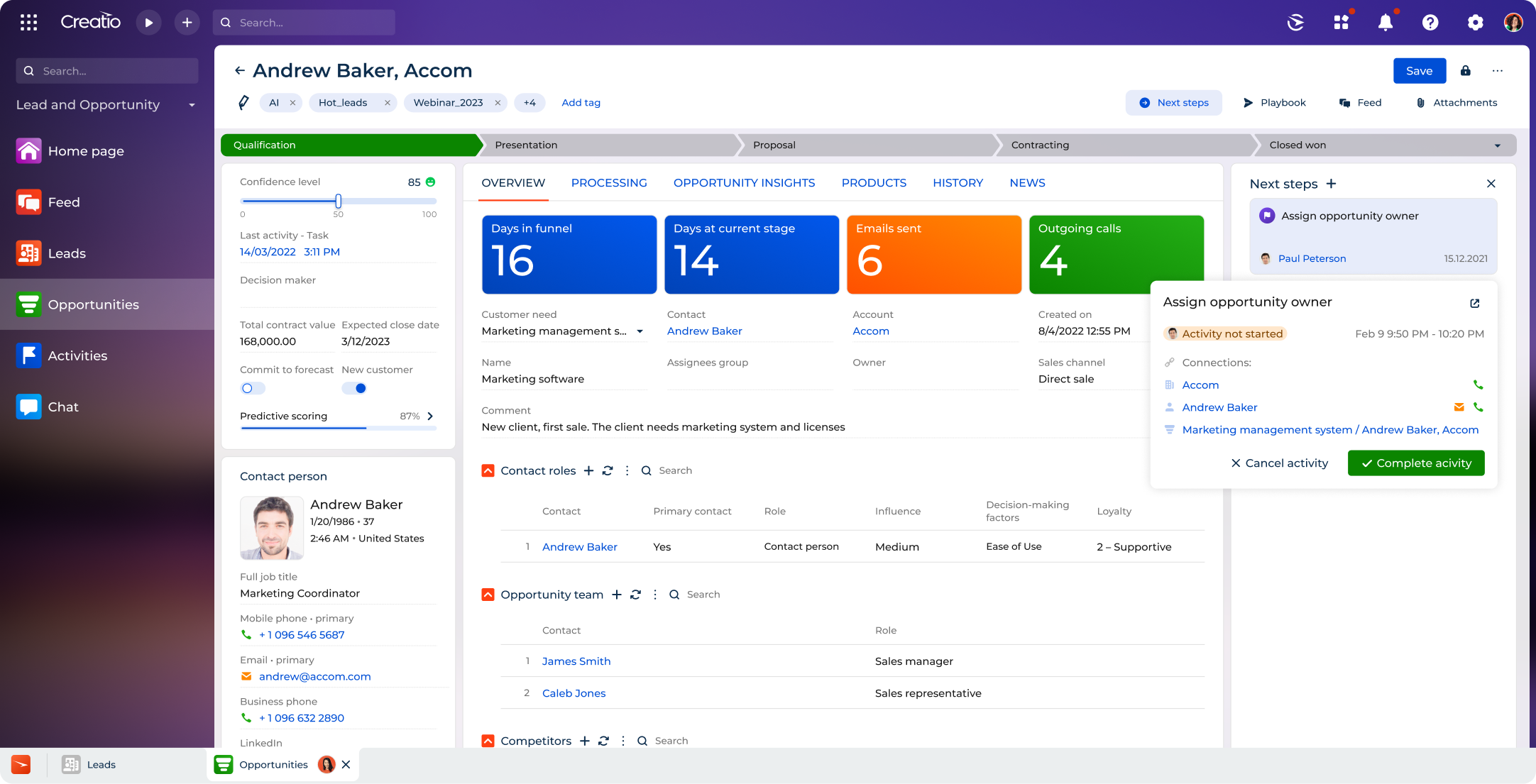
Creatio provides a comprehensive CRM suite for marketing, service and sales automation, fully integrated within a single AI-native platform. The system may be deployed either as a complete CRM solution or as standalone modules, configured to meet specific organisational requirements:
- Creatio Marketing – a new era marketing platform to accelerate lead-to-revenue cycle with AI and no-code at its core.
- Creatio Sales – a new era sales platform to manage end-to-end sales cycle with AI and no-code at its core.
- Creatio Service – a new era service platform to delight customers and drive service excellence with AI and no-code at its core.
- Creatio Studio - a no-code agentic platform to build powerful business applications and AI agents with natural language and visual designers.
At Creatio CRM, AI is embedded at the core of the platform, with full contextual awareness of all CRM objects, including data, relationships, workflows, and processes. Its modern conversational AI workspace allows users to perform any CRM task using natural language commands or initiate role-based agent actions directly via chat. Unlike many other CRM platforms, Creatio’s AI capabilities are fully integrated and available at no additional cost.
To maximise the synergy between human expertise and technology, Creatio also provides ready-to-use AI-powered agents for sales, marketing, and service operations. These agents handle repetitive tasks, optimise workflows, and scale operations effectively, enabling employees to devote more time to customers and concentrate on high-value, creative work.
Creatio is a strong choice for medium to large organisations seeking an adaptable, efficient, cost-effective CRM solution with an agentic architecture. Recognised as a Visionary in the 2025 Gartner® Magic Quadrant™ for Sales Force Automation Platforms, the company is noted for both its execution capabilities and the completeness of its vision – further reinforcing its credibility and performance.
Core features:
- A 360-degree customer view to gain a holistic understanding of each customer – from first touch to long-term relationship.
- Agentic Platform for CRM and workflow automation solutions across Marketing, Sales, and Service operations.
- Sales Agents: Account Research Agent, Meeting Agent, and Quote Generation Agent to improve sales representatives' performance and accelerate deal cycles.
- Marketing Agents: Lead Conversion Agent, Marketing Content Agent, and Email Generation Agent to assist marketers in nurturing prospects, creating personalised campaigns, and increasing engagement at scale.
- Service Agents: Customer Support Agent and Knowledge Base Agent to automate ticket resolution, deliver instant answers, and enhance customer satisfaction.
- No-Code Agent Builder to create fully functional AI agents by visually composing skills, workflows, and knowledge – no technical expertise required.
- AI-Assisted No-Code & Composable Architecture enabling business users to tailor the CRM platform to their specific workflows and scale operations efficiently.
- 700+ applications and integrations available at Creatio Marketplace
- Over 20 industry-specific CRM workflows with pre-built features and tools designed to optimise performance.
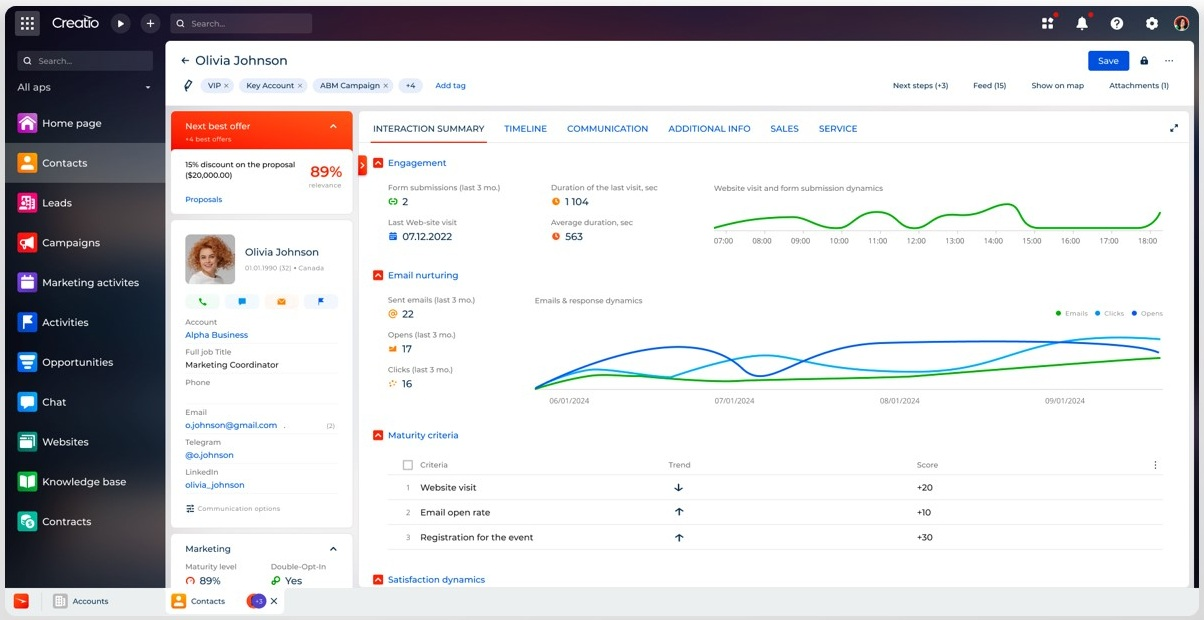
Advantages:
- A single agentic platform to automate CRM and workflows across sales, marketing, and service functions
- AI-driven automation and analytics that support teams throughout the entire customer lifecycle, delivering actionable insights and enabling confident, data-driven decisions.
- The flexibility to build a fully tailored, all-in-one CRM solution aligned with specific business requirements.
- Highly customisable workflows and industry-specific processes that extend core CRM capabilities across line-of-business operations.
- A transparent, composable pricing model with AI capabilities included at no additional cost.
- A scalable architecture designed to support businesses of all sizes – from growing start-ups to large enterprises handling high volumes of customer interactions
Disadvantages:
- The platform may initially pose a learning curve owing to its extensive array of customisation options.
Customer reviews:
G2: 4.7
Capterra: 4.7
Gartner: 4.9
2. Hubspot
HubSpot is a preeminent CRM platform renowned for its robust inbound marketing capabilities and intuitive interface. It provides a comprehensive suite of tools designed for adept lead management, personalised marketing automation, and data-driven insights, all of which are instrumental in enhancing customer relationships.
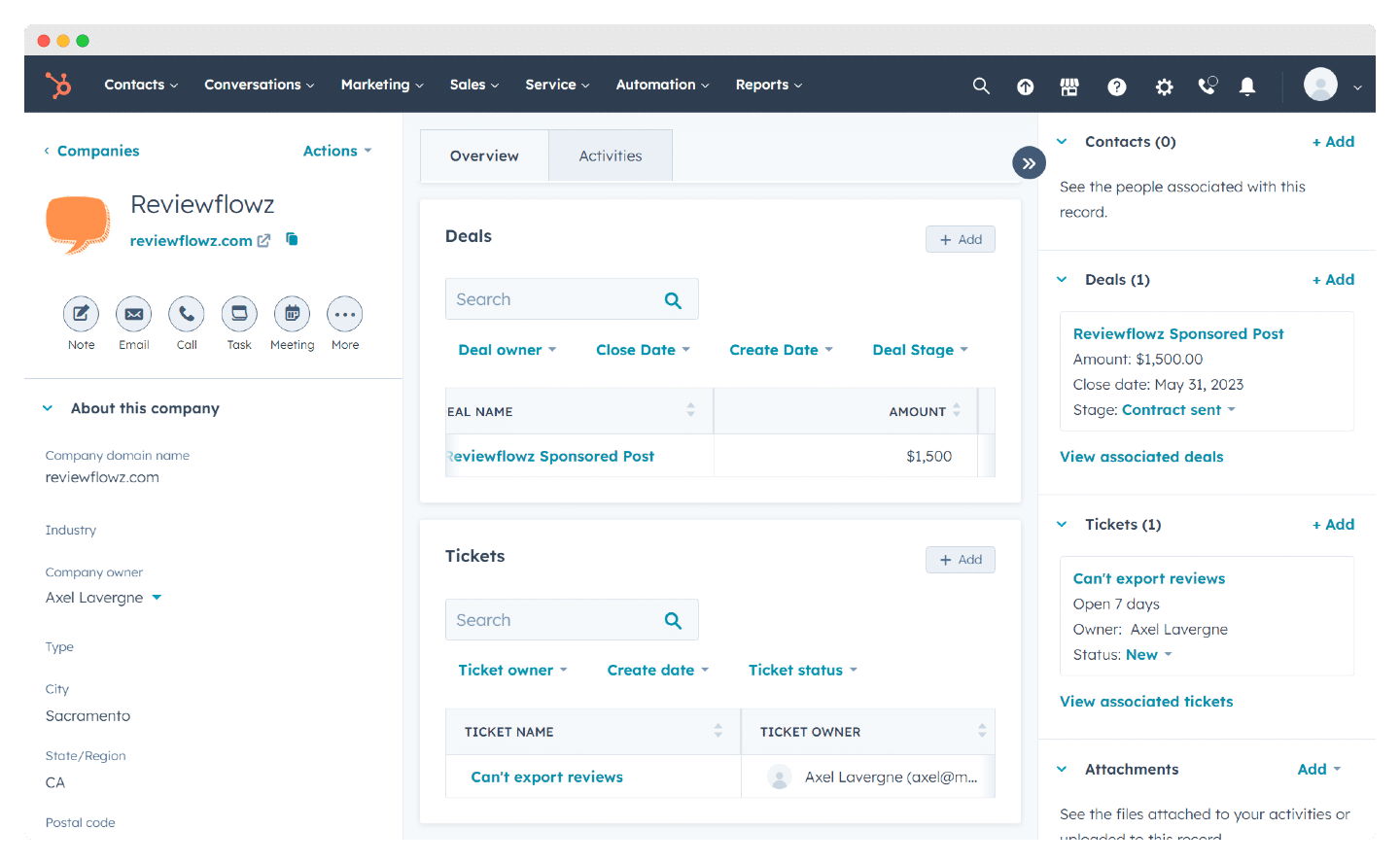
Core features:
- Contact management: Centralises customer data, enabling comprehensive management, segmentation, and tracking of interactions.
- Marketing automation: Facilitates the creation of personalised email campaigns and the automation of marketing workflows through an intuitive visual editor.
- Sales automation: Enhances efficiency with lead scoring, deal tracking, and pipeline management.
- Inbound marketing tools: Provide tools for building landing pages, optimising SEO, and capturing leads via forms.
- Reporting and analytics: Utilises AI to deliver detailed insights and performance metrics.
- Customer support tools: Includes ticketing, customer feedback, and knowledge base features to improve service and manage support.
- Integration library: Supports essential integrations like Salesforce, Google Workspace, and social media platforms.
Advantages:
- User-friendly interface ensures quick mastery and minimal training
- Advanced marketing automation tailored specifically for marketers.
- In-depth reporting tools provide detailed insights into marketing and sales metrics, aiding in strategy optimisation.
- Innovative inbound marketing features include robust tools for SEO, blogging, and content creation to attract and convert leads.
- Free CRM plan provides a wide range of features, ideal for small businesses and startups.
Disadvantages:
- Limited integration options
- Restricted customisation options for CRM workflows.
Customer reviews:
G2: 4.4
Capterra: 4.5
Gartner: 4.5
3. Microsoft Dynamics 365
Microsoft Dynamics 365 is a highly esteemed CRM platform renowned for its expansive suite of business automation tools, which facilitates the implementation of a robust CRM strategy. Its extensive array of features and integrations ensures the optimisation of workflows and the enhancement of productivity across various departments.
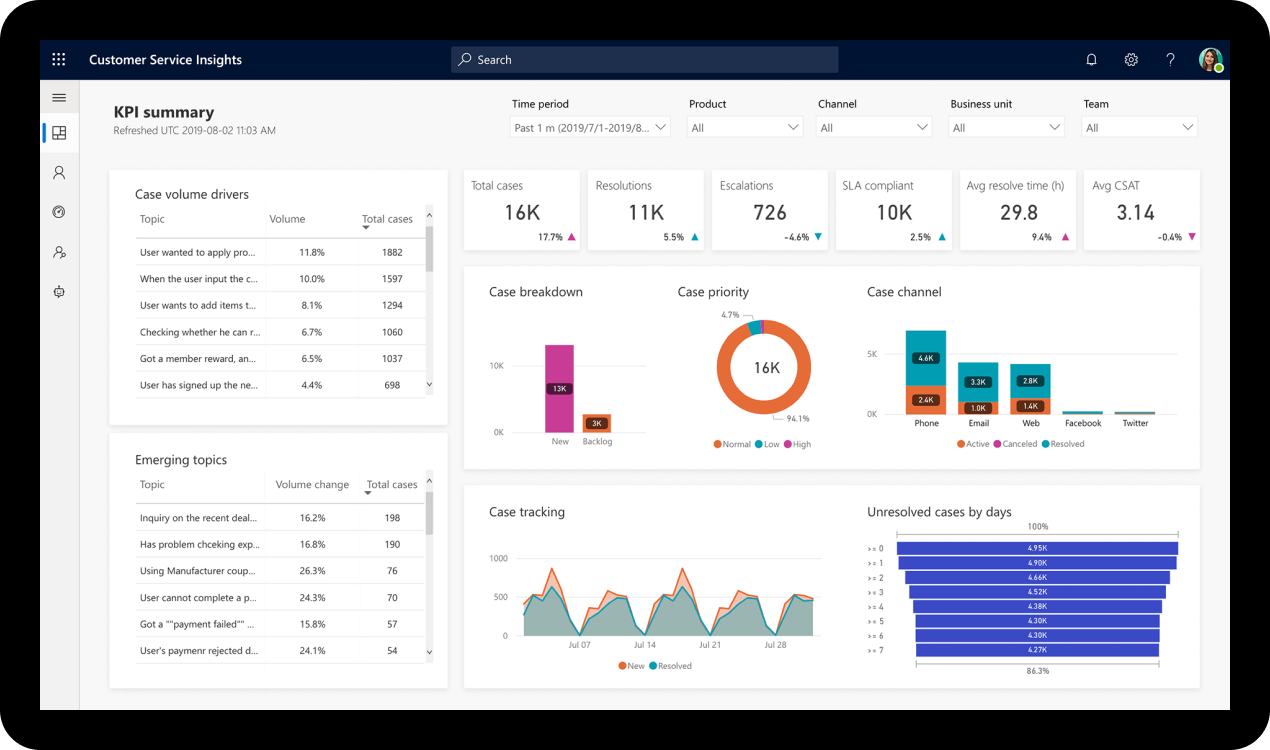
Core features:
- Sales automation for managing the entire sales process, including lead tracking, pipeline management, and forecasting.
- Customer service tools such as case management, knowledge base, and AI-powered virtual agents to enhance customer support.
- Marketing automation and customer segmentation tools.
- Built-in AI features and real-time analytics that provide actionable insights into customer behaviour, sales trends, and business performance.
- Seamless integration with Microsoft products.
- No-code/low-code tools for automating business processes and customising workflows to suit unique business needs.
Advantages:
- Integration with the Office ecosystem ensures a seamless data flow through functionalities such as Dataverse.
- Utilising low-code tools, Microsoft Dynamics 365 enables citizen developers to easily expand CRM capabilities, create detailed analytics, and develop new automations.
- The unified suite of CRM applications, encompassing Sales and Service clouds, facilitates consistent data sharing and insights within the organisation.
- Advanced AI capabilities in Microsoft Dynamics 365 offer predictive insights, sales forecasting, and AI-driven recommendations. Tools like Dynamics 365 Copilot assist users in automating routine tasks and generating valuable customer insights.
Disadvantages:
- Limited integration capabilities with tools beyond the Microsoft ecosystem.
- Obscure pricing model that does not facilitate the acquisition of unbundled CRM tools.
Customer reviews:
G2: 3.8
Capterra: 4.4
Gartner: 4.4
4. Freshworks
Freshworks represents a sophisticated CRM platform enriched with artificial intelligence, meticulously designed to optimise sales, marketing, and customer service processes, thereby facilitating revenue enhancement. The CRM system is integrated with Freddy AI, which delivers predictive insights, automates workflow processes, and provides smart recommendations.
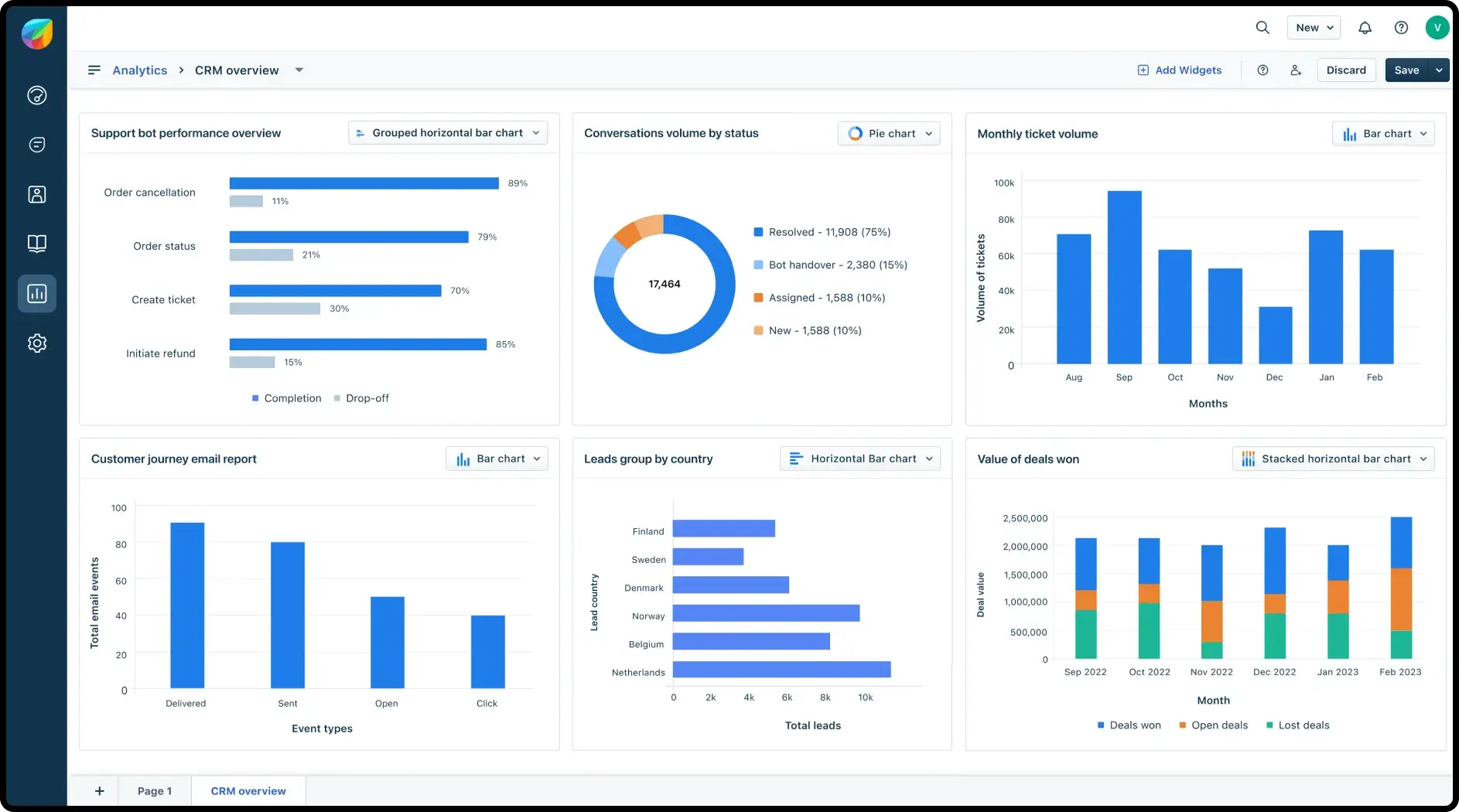
Core features:
- Marketing automation tools for email marketing, customer engagement management, and bespoke communication through targeted messaging.
- Customer support features encompass management, live chat functionalities, and seamless integrations with help desk systems.
- Sales pipeline management enables tracking and optimising the sales process, facilitating enhanced oversight and efficiency throughout the pipeline.
- Workflow automation for routine tasks such as follow-up emails, task creation, and lead assignment, thus enabling teams to concentrate on strategic initiatives.
- Freddy AI – Freshworks' AI assistant, Freddy, provides predictive insights, lead scoring, and automated suggestions, enhancing both sales and customer support efficacy.
- Customisable dashboards and reporting tools for in-depth analysis of sales performance, customer behaviour, and campaign effectiveness.
- Integrations with various third-party applications, including Slack, Mailchimp, and Google Workspace, provide a versatile and interconnected ecosystem.
Advantages:
- Freshworks excels in user-friendliness, ensuring swift and efficient adoption with minimal training.
- The platform offers extensive and seamless integrations with Gsuite and other essential tools, providing superior connectivity compared to many rivals.
- Integrated AI capabilities automate routine tasks, streamline workflows, and enhance customer relationship management processes, thus saving time and increasing productivity.
- Affordable pricing.
Disadvantages:
- Limited customisation: customisation options are somewhat restricted, with advanced workflow automation capabilities being less comprehensive compared to other platforms.
- Modest integration: fewer integration options with business automation tools than some larger CRM solutions.
- Basic analytics: while the reporting is solid, it may lack the depth and granularity of more extensive CRM platforms.
Customer reviews:
G2: 4.5
Capterra: 4.5
Gartner: 4.3
5. Zoho CRM
Zoho CRM is a comprehensive and customisable customer relationship management platform, meticulously crafted to facilitate the automation of sales, marketing, and support processes. It is tailored to accommodate organisations of varying sizes, providing both scalability and an extensive suite of tools designed to enhance customer engagement, optimise lead management, and refine workflow efficiency.
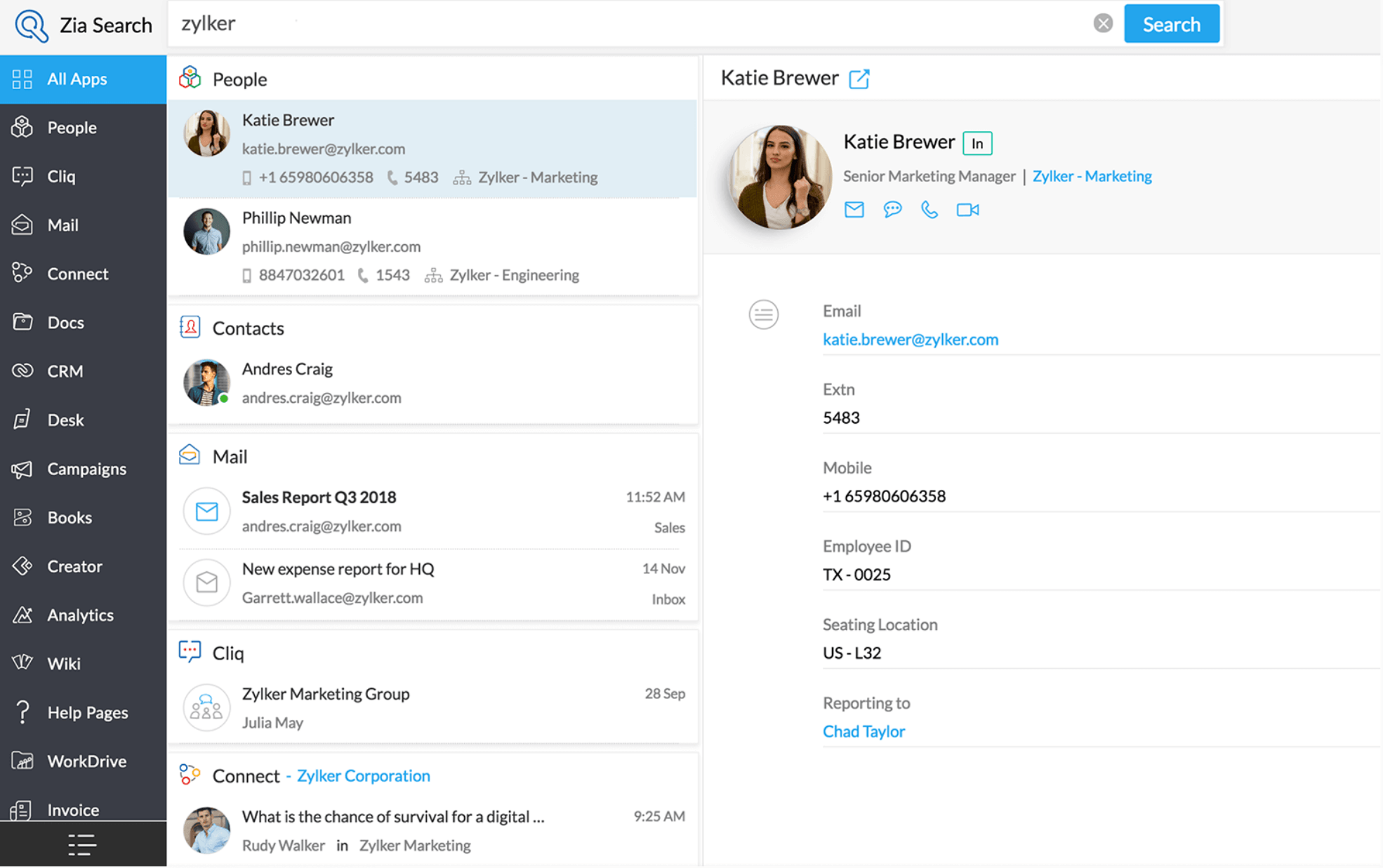
Core features:
- Sales pipeline management monitors leads through the sales funnel with intuitive pipeline views and drag-and-drop functionality, from initial contact to deal closure.
- Workflow automation assists in automating routine tasks such as follow-up emails, lead assignments, and task creation, thereby allowing focus on strategic initiatives.
- Zoho’s AI assistant, Zia, predicts lead conversion likelihood, automates repetitive tasks, and offers insights through anomaly detection and sentiment analysis to aid decision-making.
- Reporting and dashboards monitor key metrics, including sales performance, customer behaviour, and campaign effectiveness.
- Integration with over 500 third-party applications.
Advantages:
- Zoho CRM affords considerable flexibility in tailoring the platform to align precisely with bespoke business workflows and operational processes.
- The platform’s flexible pricing structure renders it accessible to small enterprises, whilst simultaneously offering sophisticated functionalities for larger organisations.
- Zia’s AI capabilities enhance operational efficiency through lead scoring, workflow automation, and predictive analytics.
- A free plan is available, providing fundamental CRM features such as contact management and sales automation.
Disadvantages:
- Given its extensive array of features and customisation capabilities, Zoho CRM may necessitate a more considerable investment in training for users to fully harness its potential.
Customer reviews:
- G2: 4.1
- Capterra: 4.4
- Gartner: 4.3
6. Zendesk
Zendesk is a CRM platform with a great emphasis on support service, offering a sophisticated array of support features, including an advanced ticketing system and omnichannel support, along with robust sales automation.
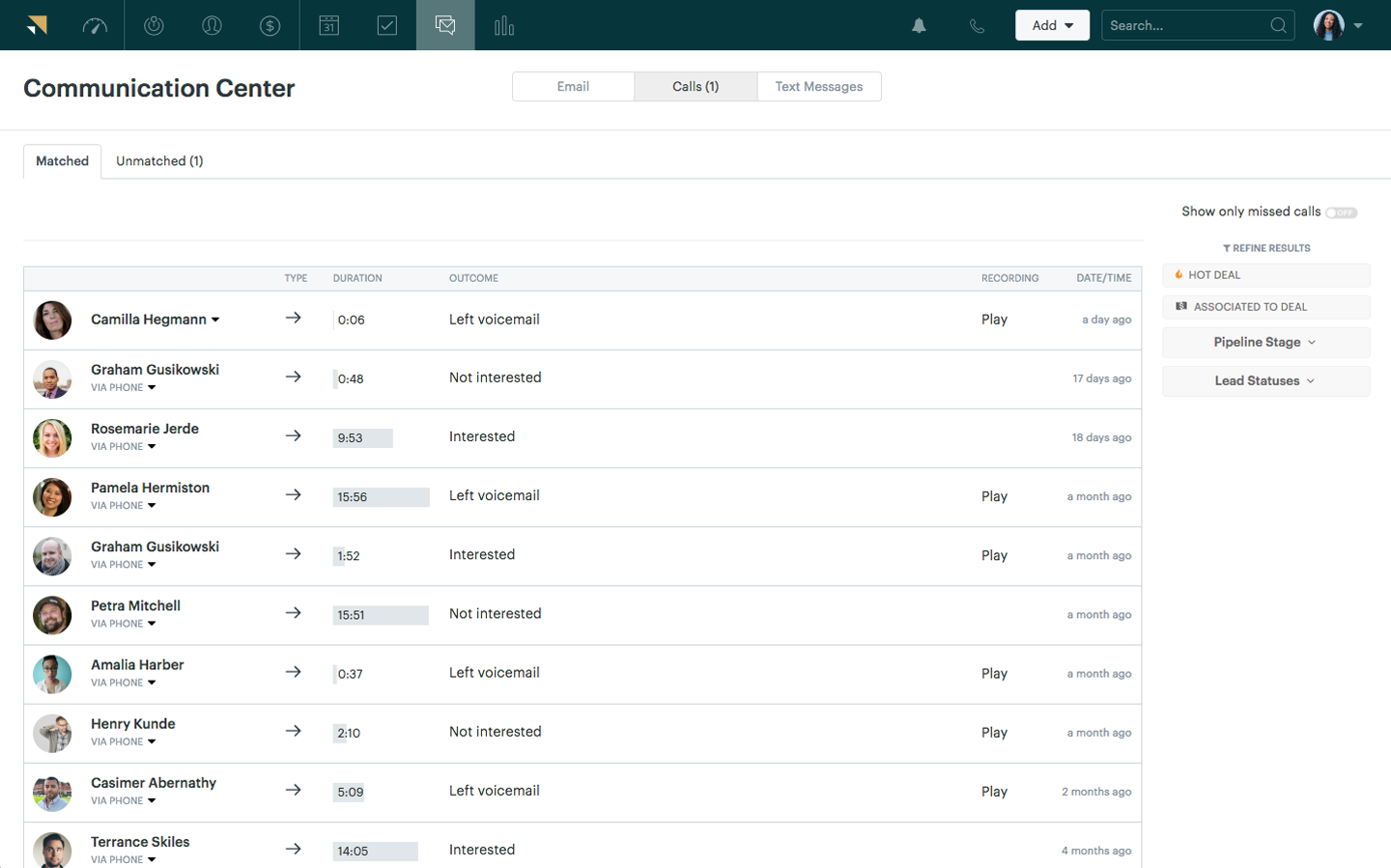
Core features:
- Advanced ticketing system with automated routing and Service Level Agreements (SLAs).
- Self-service portals for creating help centres, easing the burden on support teams.
- AI-driven bots for automating FAQs and directing customers to relevant support articles.
- Customisable dashboards, analytics and reporting for actionable insights.
- Integration with third-party tools, including Salesforce, Shopify, and Slack.
Advantages:
- Emphasis on delivering exceptional customer service.
- Extensive automation capabilities for categorising and routing tickets.
Disadvantages:
- Zendesk’s pricing model may become expensive as businesses expand their usage of advanced features and customisations.
- The scope for customisation of ticketing workflows is relatively constrained compared to other CRM platforms.
Customer reviews:
- G2: 4.3
- Capterra: 4.4
- Gartner: 4.2
7. Pipedrive
Pipedrive is tailored for small to medium-sized enterprises seeking to refine sales processes and drive revenue growth. It is distinguished by its robust focus on visual pipeline management and user-friendliness, designed to streamline sales operations with efficiency.
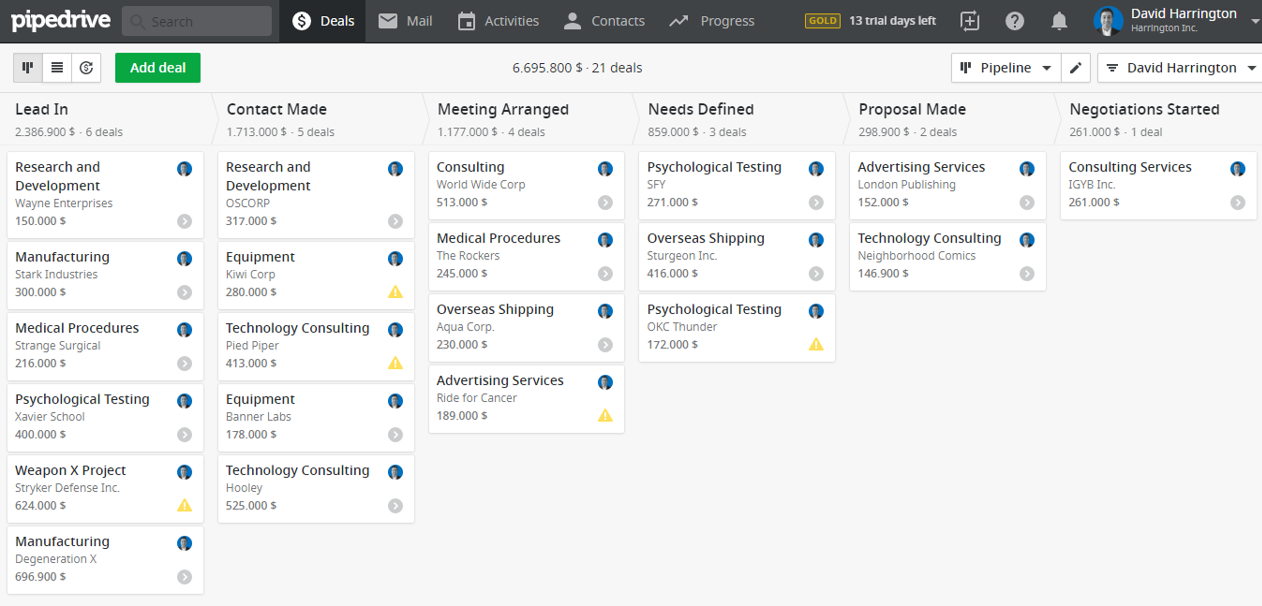
Core features:
- Visual sales pipeline, which provides a clear, customisable view of deals at various stages.
- Sales automation.
- Lead and deal management.
- Sales forecasting and reporting.
- Integrations with over 250 third-party apps, including tools like Slack, Trello, and Google Workspace.
Advantages:
- The interface is notably user-friendly, facilitating a swift and uncomplicated learning curve
- The platform permits extensive customisation of pipelines, reports, and workflows, ensuring alignment with bespoke sales processes.
- Pipedrive is laser-focused on optimising sales processes, rendering it an exemplary choice for enterprises, where sales represent the foremost priority.
- Pipedrive offers affordable plans, catering effectively to both small and growing businesses.
Disadvantages:
- Limited marketing functionalities.
- Basic customer support tools.
Customer reviews:
- G2: 4.3
- Capterra: 4.5
- Gartner: 4.3
8. Monday.com CRM
Monday.com presents a CRM platform that is both highly visual and extensively customisable, distinguished by its intuitive interface. It facilitates management of sales pipelines, the tracking of customer interactions, and the automation of workflows within a collaborative framework.
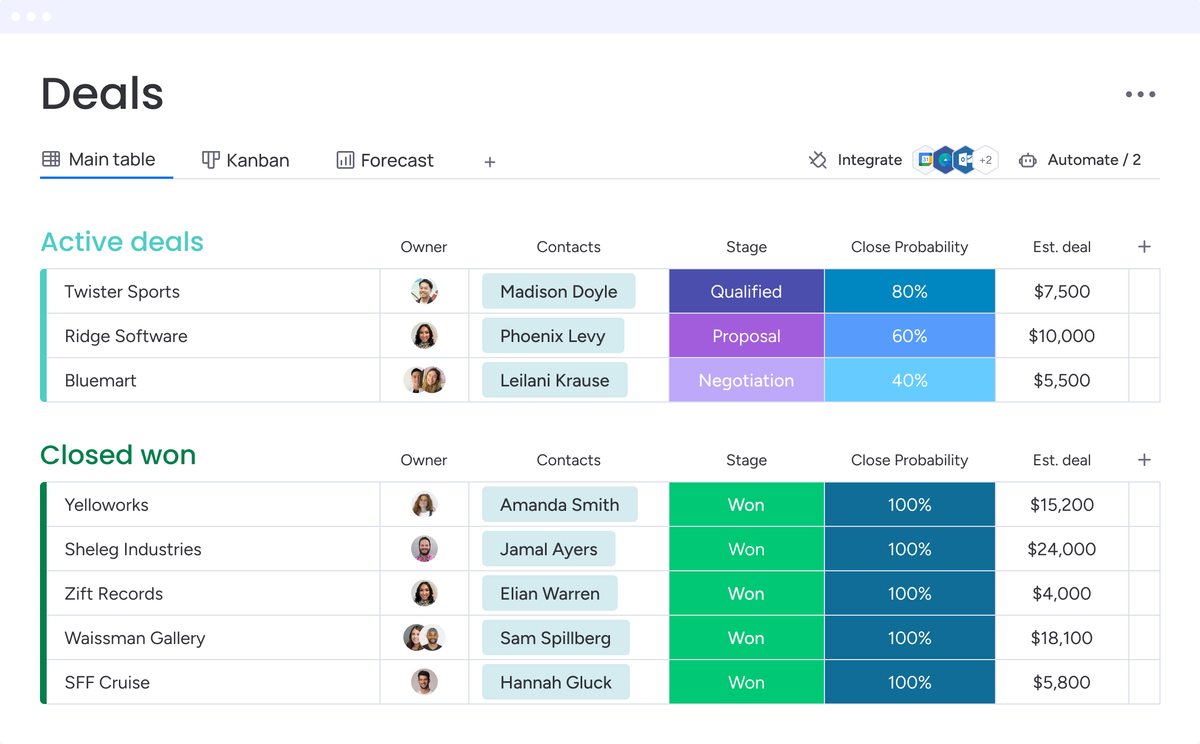
Core features:
- Customisable pipelines.
- Automation capabilities for routine tasks, including follow-up reminders, status updates, and email notifications.
- Reporting and analytics that deliver insights into sales performance, customer engagement, and team productivity.
- Integration with a range of third-party applications, such as Slack, Google Workspace, and Mailchimp.
- Project management functionalities.
Advantages:
- Visual interface facilitates effortless tracking of tasks and monitoring of progress.
- A free version of the platform is available.
Disadvantages:
- CRM capabilities may be relatively superficial in comparison to more robust platforms, offering less depth in customer relationship management.
Customer reviews:
- G2: 4.6
- Capterra: 4.6
- Gartner: 4.5
9. Keap CRM
Keap is a CRM meticulously crafted for small enterprises, placing a strong emphasis on sales automation and email marketing. Its intuitively designed platform aids businesses in streamlining their customer relationship management, sales, and marketing processes.
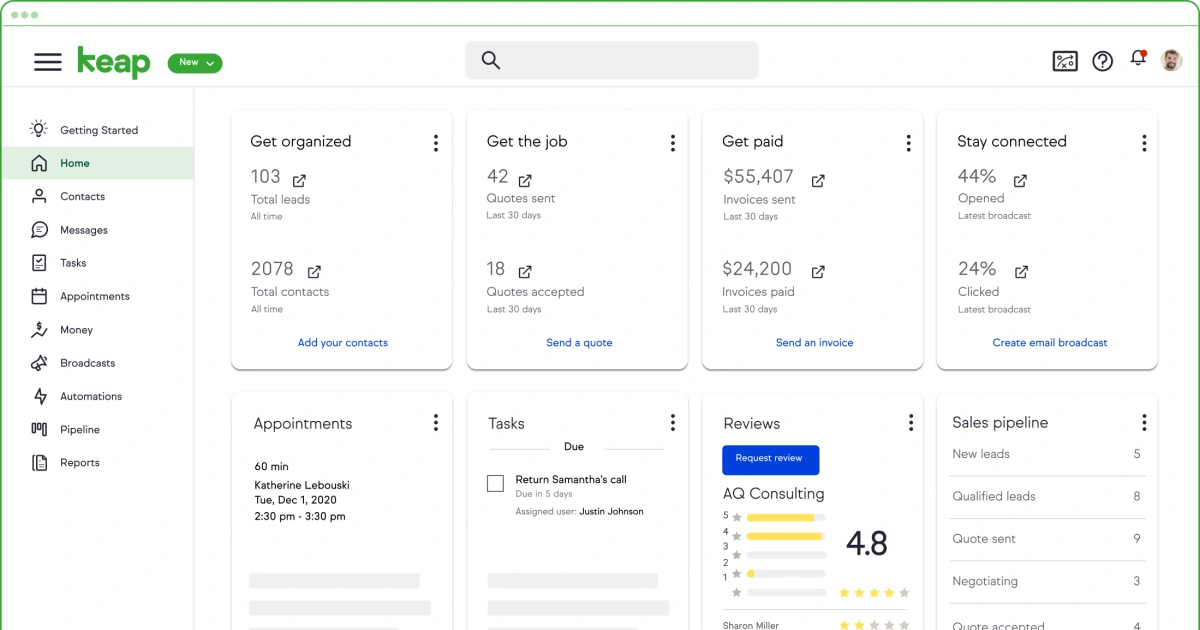
Core features:
- Automation of sales and marketing processes.
- Lead scoring mechanisms.
- Email marketing capabilities.
- Comprehensive contact management.
Advantages:
- All-in-one solution for both sales and marketing automation, making it particularly advantageous for small businesses.
- Straightforward email marketing tools that facilitate lead nurturing and bolster customer retention.
Disadvantages:
- Keap might not meet the needs of larger enterprises or those with more sophisticated requirements, due to its constraints in advanced functionalities.
Customer reviews:
- G2: 4.2
- Capterra: 4.1
- Gartner: 4.4
10. Insightly CRM
Insightly stands as a versatile CRM platform renowned for its user-friendly nature and economical pricing structure, rendering it highly appropriate for growing businesses endeavouring to fulfil all their CRM requisites.
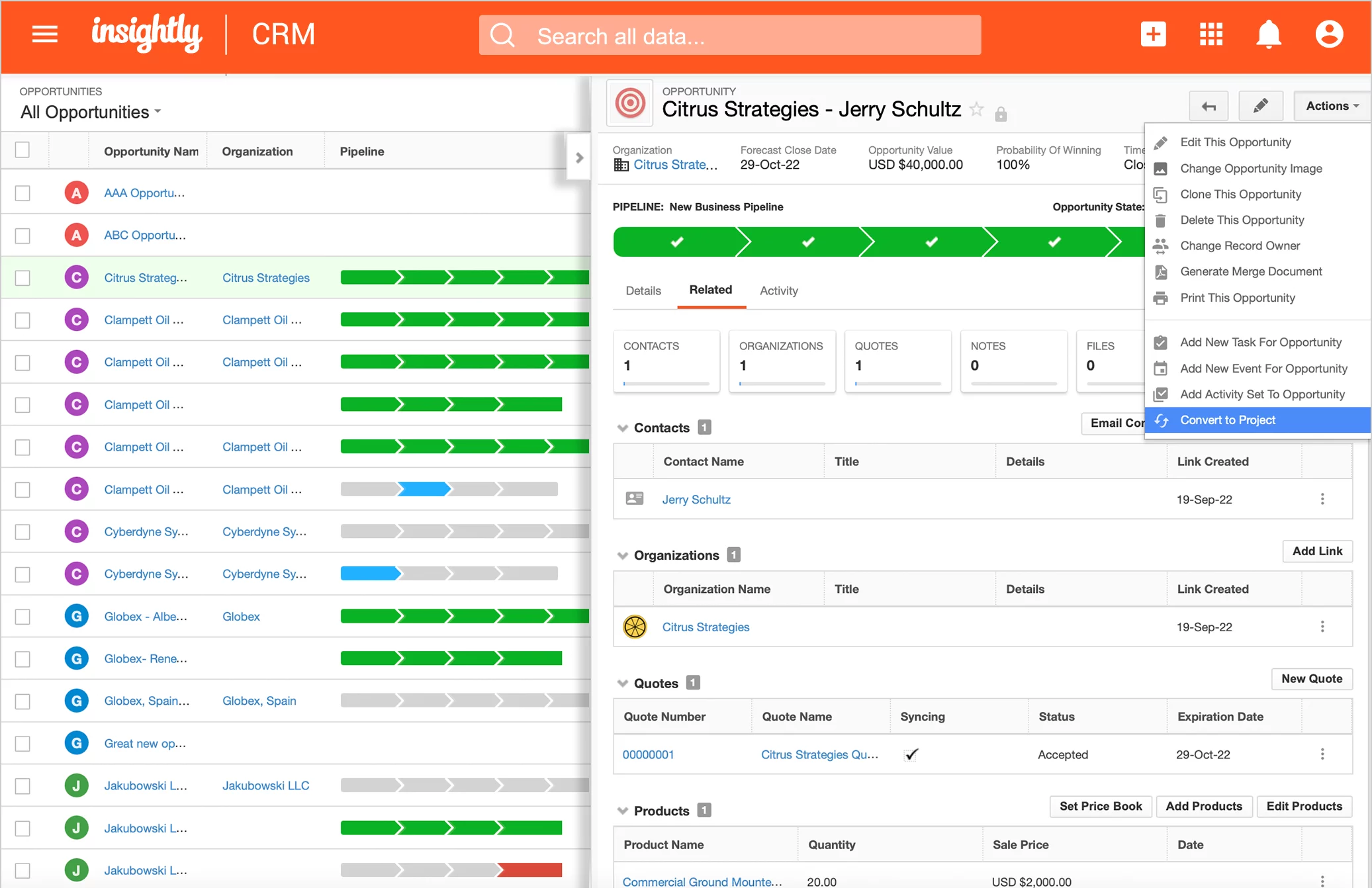
Core features:
- Contact management.
- Advanced audience segmentation.
- Email marketing.
- Workflow automation.
- Integrations with over 2000 applications.
Advantages:
- Affordable pricing model for a comprehensive CRM solution.
- Extensive contact management and customer relationship tracking.
Disadvantages:
- Automation options are somewhat restricted in comparison to more advanced CRMs.
Customer reviews:
- G2: 4.2
- Capterra: 4.0
- Gartner: 4.2
Five Steps to Selecting Your Optimal CRM
With an abundance of CRM solutions available, far exceeding the scope of this article, selecting the most suitable one can indeed be a formidable task.
The following five steps are crafted to assist you in making a well-informed, strategic choice, thereby enabling you to identify the CRM software that best aligns with the specific needs of your business.
Step 1: Determine your objectives and requirements
The initial stage in the selection of a CRM involves meticulously delineating your business objectives. What precise outcomes do you aspire to achieve with CRM software? Are your primary aims centred on augmenting sales, refining marketing strategies, enhancing customer support, or perhaps a synergistic blend of these elements?
For instance, when Novaturas embarked on their request for a CRM solution, their foremost objective was to bolster sales management and acquire enhanced visibility into their sales processes. Within a year of adopting Creatio, they experienced a notable 25% increase in the efficiency of their sales team.
Step 2: Establish a list of essential features
Informed by your specific requirements, compile a comprehensive list of the indispensable features for your CRM software. This inventory should encompass core functionalities pertinent to CRM, such as pipeline management, lead scoring, or case routing, alongside more general tools that enhance workflow and operational efficiency, including generative AI capabilities or no-code tools for extensive customisation.
At this stage, consider addressing the following essential questions:
- Is an on-premise CRM preferable, or would a cloud-based solution better suit your needs? Where would you like your customer data to be stored, and how does this preference align with your company’s security and compliance policies?
- What does your existing technology stack entail? Identify which CRM integrations are critical for ensuring seamless connection with your current tools and systems.
- What are your requirements for customisation? Do you need the flexibility to create bespoke data fields, design personalised dashboards, or automate workflows and business applications tailored to your specific processes?
- Is there a need for pre-configured CRM features tailored to your industry? In such cases, you might consider exploring CRM solutions designed for particular sectors or seeking out integrations and automations that cater to your specific operational needs.
Step 3: Assess your budget and opt for an appropriate payment model
Examine your budgetary constraints and select a payment model that aligns with your financial strategy. CRM pricing generally presents two principal structures: per-user fees or a fixed rate for a set number of users. Should you anticipate substantial growth, a fixed fee arrangement might provide greater cost stability, whereas per-user fees can escalate in tandem with the expansion of your team.
Be cautious of CRM solutions that, although seemingly economical, may relegate essential functionalities - such as advanced reporting, AI-driven tools, or automation - to higher-priced plans or additional modules. These extra costs can significantly impact your overall expenditure. Consequently, it is prudent to factor in the expenses for any requisite features, integrations, or support services that extend beyond the basic subscription package.
Step 4: Narrow down your choices and solicit feedback
It is imperative to delve into the CRM marketplace and identify a selection of options that meet your requirements. To gather reliable and comprehensive insights on CRM software, one should eschew sole reliance on vendor websites and instead seek a variety of sources for a more nuanced perspective:
- Seek input from other businesses and professionals within your network who have direct experience with a variety of CRM platforms.
- Consult industry experts or analysts for bespoke recommendations tailored to your business requirements. For instance, Forrester and Gartner reports offer valuable insight into the most highly-regarded CRM solutions.
- Delve into user reviews and comparative analysis on trusted platforms such as G2 and Capterra, where genuine users share detailed feedback, highlighting both advantages and shortcomings of various CRM options.
Step 5: Test your shortlisted options and finalise your choice
Many CRM providers extend free trials or live demonstrations, allowing you to evaluate their functionality directly. Begin by assessing the core elements crucial to your business - such as usability, integration capabilities, automation tools, or reporting functionalities. Consider the following practical guidelines:
- Simulate diverse use cases: Recreate authentic business scenarios, such as constructing sales pipelines, managing lead progression, or automating customer service operations, to gauge the CRM’s performance in a real-world context.
- Assess support and training: Leverage this phase to evaluate the responsiveness of customer support and the accessibility of training resources, both of which are indispensable during the onboarding period.
- Involve end-users: Actively engage front-office teams in the evaluation process to ensure that the system meets the practical needs of those who will be interacting with it daily, such as sales representatives and customer service personnel.
Ultimately, select the CRM that best accommodates your workflow, aligns with your budget, and meets your business objectives, having thoroughly scrutinised its suitability in practice.
How Creatio CRM Surpasses Other CRM Solutions
In an increasingly saturated CRM market, Creatio sets itself apart as a highly adaptable no-code platform, specifically designed to deliver advanced workflow automation with exceptional flexibility. Its powerful combination of customisation capabilities and intuitive user experience makes it a compelling choice for enterprises that value operational efficiency, streamlined processes, and ease of use.
The following points highlight why Creatio should be considered the CRM solution of choice:
1. True No-Code
With Creatio CRM, business users are empowered to build and deploy applications and AI agents using natural language and visual no-code designers, without the need for advanced coding expertise. Creatio’s no-code development approach allows organisations to achieve exceptional time-to-value, even when managing highly complex workflows. According to an independent study by Nucleus Research, Creatio’s no-code capabilities reduce total cost of ownership (TCO) by 37%, resulting in lower implementation expenses, faster adoption, and improved long-term ROI.
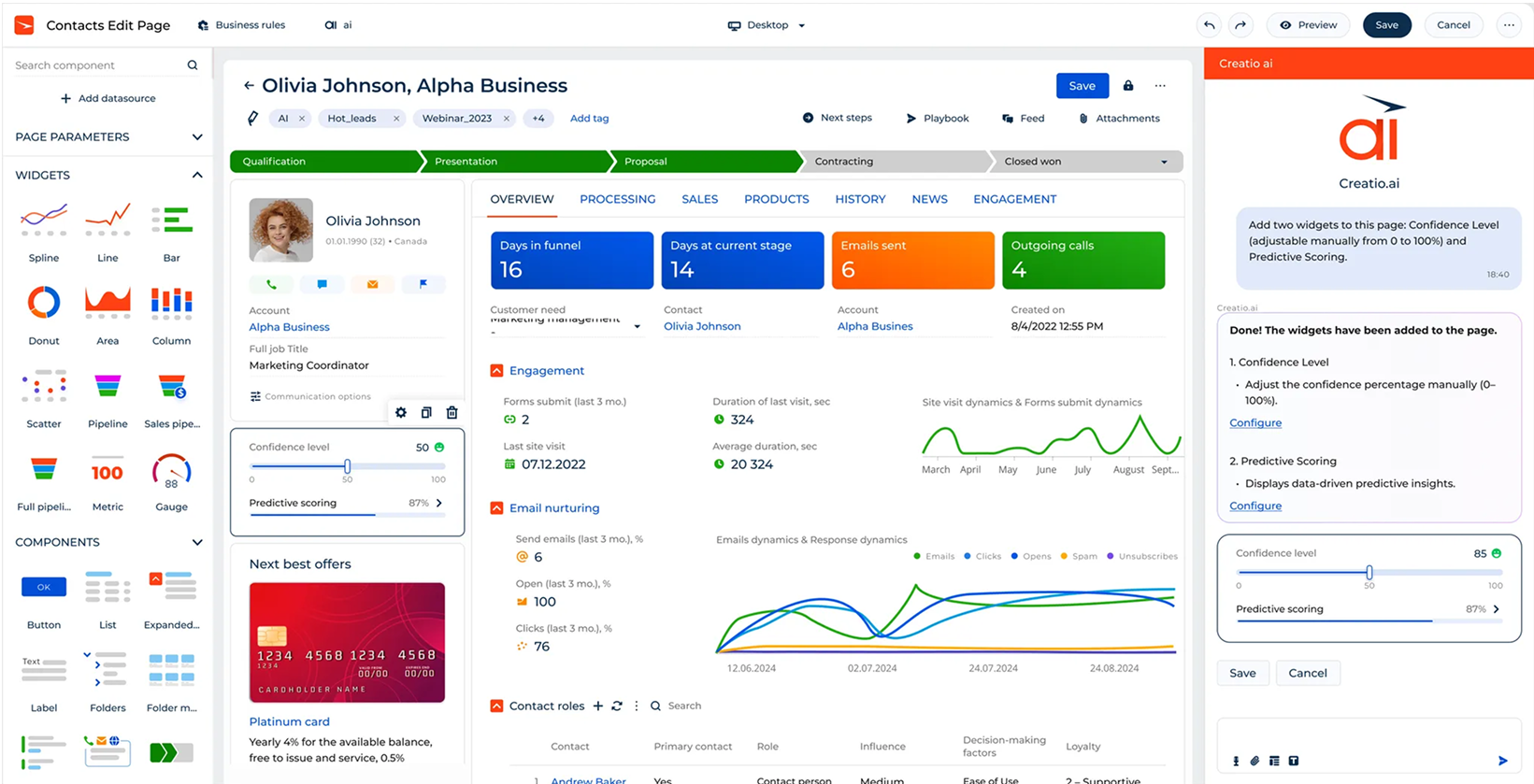
2. New Era CRM and Workflow Agents and Applications
Creatio is redefining the standard for CRM by offering a unified platform that natively combines AI agents and no-code applications. This hybrid approach — where human expertise is enhanced by digital agents — enables organisations to accelerate outcomes and scale operations with confidence. Creatio’s ready-to-use CRM agents and applications are designed for rapid adoption, driving productivity improvements and delivering measurable value from day one.
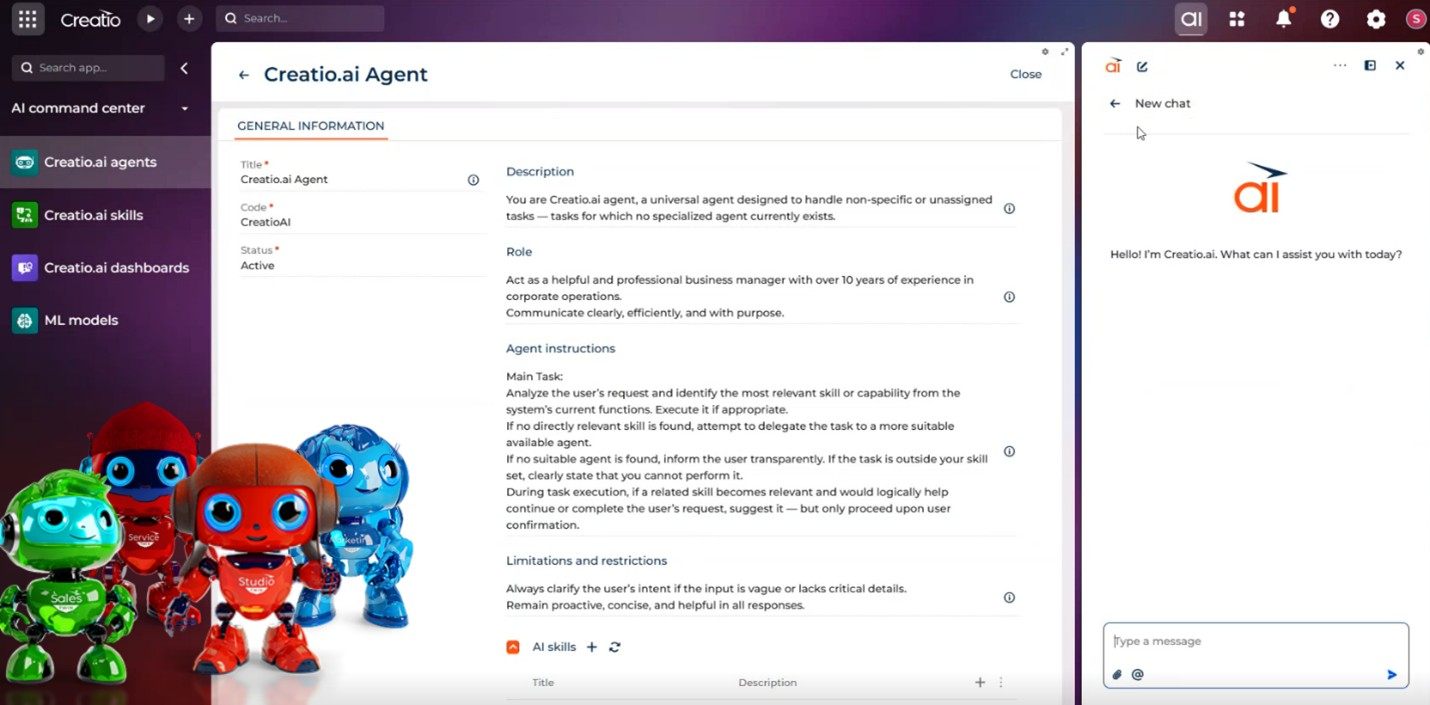
3. AI at the Core
While traditional CRM providers often add AI capabilities to overly complex and heavily engineered systems, Creatio takes a different approach – offering a unified platform that natively integrates best-in-class CRM applications and intelligent agents. With both applications and pre-built agents embedded at the platform’s core, organisations can accelerate workflow automation, adapt with greater ease, and scale operations without unnecessary complexity.
Moreover, Creatio’s conversational interface further reduces the learning curve and removes training barriers, empowering employees to enhance productivity and deliver results from day one.
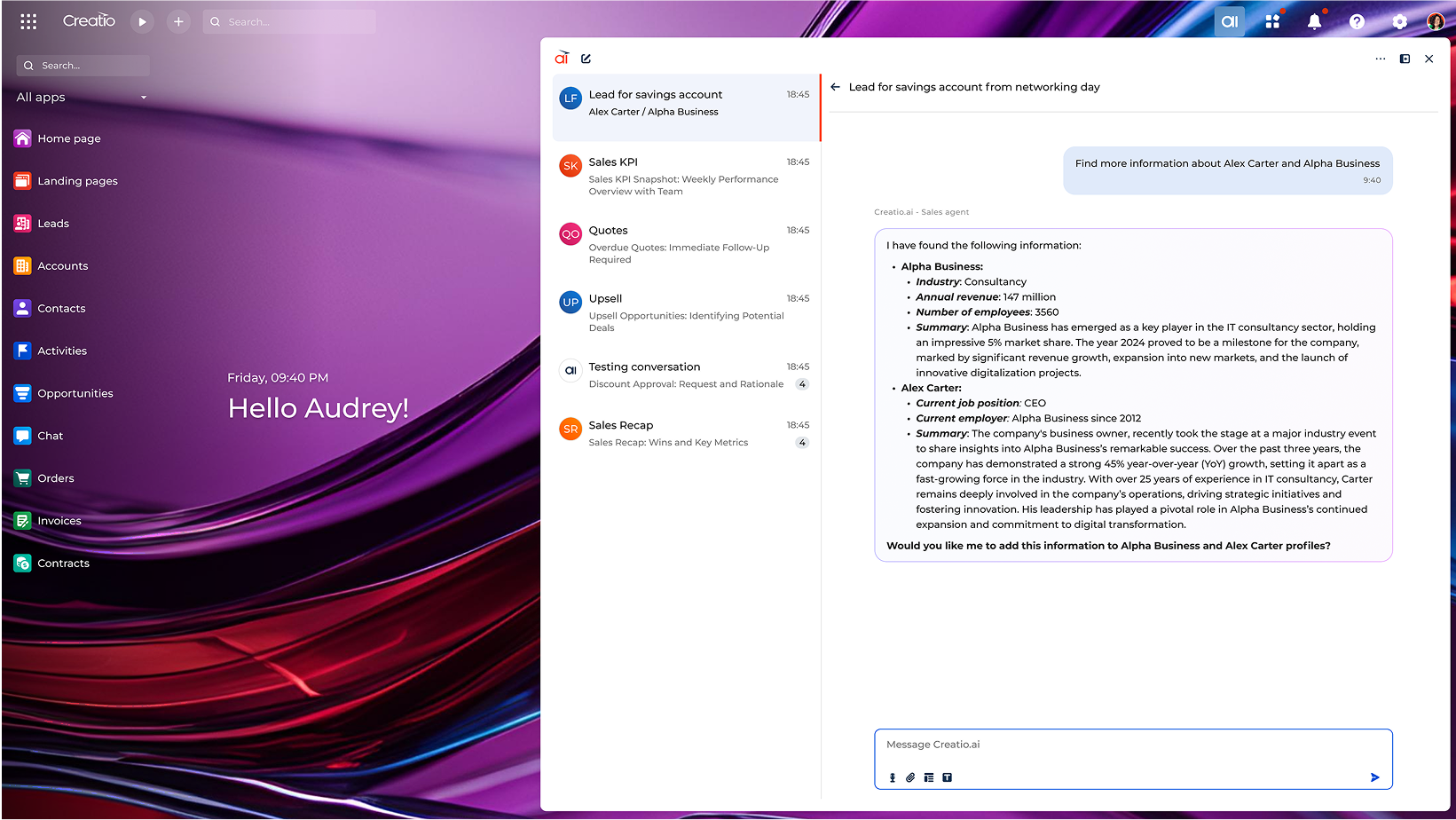
4. Highest ROI on the Market
According to Nucleus Research, Creatio delivers the fastest time-to-value, lower total cost of ownership, and immediate business impact through its no-code platform. By combining best-in-class CRM applications with AI-native no-code capabilities, the platform is both powerful and straightforward to deploy.
For example, BSN Sports implemented Creatio CRM from concept to go-live in just four weeks, clearly demonstrating the platform’s remarkable efficiency and the speed with which organisations can achieve measurable results.
5. Recognised by Leading Industry Analysts
Industry recognition remains one of the most incredible indicators of a platform’s value and reliability. Creatio has been acknowledged multiple times by reputable industry analysts for its innovation, flexibility, and proven outcomes:
- Visionary in the Sales Force Automation Platforms Report by Gartner, 2025
- Leader in the B2B Marketing Automation Platforms Report by Gartner, 2024
- Strong Performer in the Customer Relationship Management Report by Forrester, 2025
- Only Leader in the 2024 Forrester Wave™: Low-Code Platforms for Citizen Developers
Such recognitions underscore Creatio’s consistent leadership in combining CRM, no-code, and AI capabilities – demonstrating its ability to deliver measurable business value across industries.
Summary
CRM software has become an essential tool for organisations seeking to strengthen customer relationships, enhance team productivity, and accelerate growth. Modern platforms go far beyond contact management, aligning business operations, delivering AI-powered insights, and automating complex workflows to enable seamless customer experiences. The new era CRM is Agentic, where role-specific AI agents work alongside human teams to handle routine tasks, scale operations, and unlock measurable value from day one.
Creatio stands out in this space as the only platform that combines AI, no-code, and agentic automation at its core — delivering the fastest time-to-value, lower TCO, and the highest ROI on the market.

